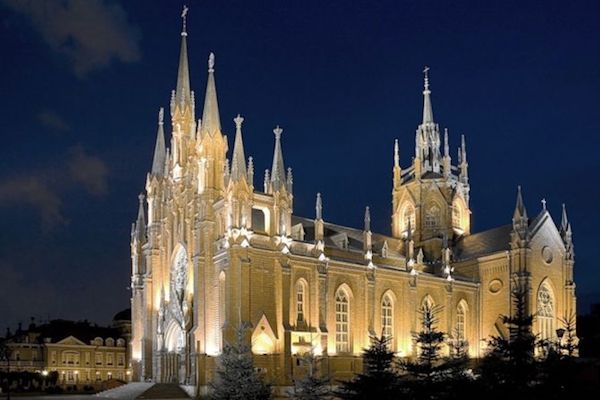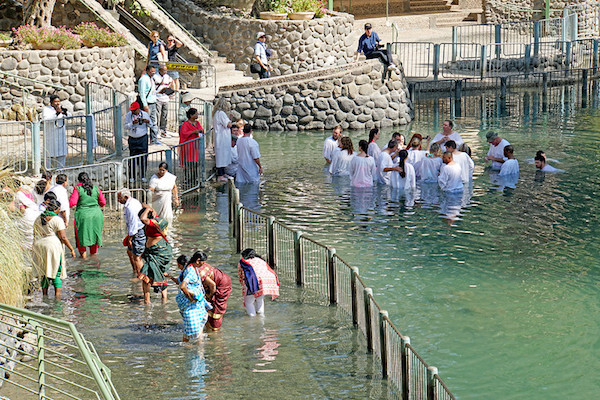American President Joe Biden called for unity and civility at the revamped National Prayer Breakfast on 2 February.
“In our politics and in our lives, we too often see each other as opponents and not competitors. We see each other as enemies, not neighbours,” Biden said.
“And as tough as these times have been, if we look closer, we see the strength, the determination that has long defined America.”
The breakfast, started in the 1950s, had become controversial in recent years, drawing thousands of conservative evangelical activists. This year’s breakfast was organised by former members of Congress on a smaller scale and as a less politicised event.
A veteran Polish Franciscan has been jailed for “hooliganism” in Russia, while another priest faces deportation for “living at the wrong address”, in a sign of new pressure against the Catholic Church by Vladimir Putin's government.
Local rights activists said Fr Marek Bakierzynski had been detained at his parish in Belgorod, near the Ukrainian border, adding that officials from the city's FSB security service had later denied knowledge of his case.
However, in a late January statement, Belgorod's district court confirmed the Franciscan, ministering in Russia for two decades, faced a prison sentence for an unspecified offence, after being convicted of “petty hooliganism” under the Code of Administrative Offences.
The Catholic Bishops’ Conference of Nigeria has issued a pastoral letter, in advance of general elections on 25 February, calling on voters to turn out in large numbers.
They say it is “a very opportune moment” and Nigerians should “vote in accordance with their conscience and good judgment, ensuring that only candidates that will improve their lives are voted into power”.
They add, “It is only with the power of the ballot that we can engender the true progress we need in this country.”
All Nigerians, especially politicians and their agents, are urged to be civil, decent, and respectful as they canvass for votes and debate the country’s future.
Violence against women “goes against the Gospel” the Church has declared in Spain.
Julia Almansa, the co-ordinator of the Commission advocating a violence-free life for women of the Archdiocese of Madrid, said the Church should be “unequivocally on the side of the victims” and ensure that parishes are “safe spaces where women can heal and feel welcome, listened to and not judged”.
Around 50 women a year are killed by their partners or spouses in Spain. Since 2003, 1,188 have died due to misogynistic violence.
The Church of Pakistan has condemned the recent suicide bombing in Peshawar as “an attempt to sow discord”.
Anglican Bishop Dr Azad Marshall lamented the loss of more than 100 lives, mostly police, in the terrorist attack on a mosque at Peshawar’s police headquarters during Friday prayers on 30 January.
He urged the government to “do more to protect all people in Pakistan, whether Christians, Muslims, or of any other religion or belief, from the violence perpetrated by such extremist sectarian criminals”.
Elsewhere, Catholic bishop paid tribute to General Pervez Musharraf, former president of Pakistan, who died last weekend. Bishop Yousaf Sohan of Multan remembered him for his support of vulnerable religious minorities.
Controversy has shaken the Ethiopian Orthodox Tewahedo Church, the second oldest institution in Ethiopia next to the state, after “illegal appointments” of 26 bishops in late January.
Archbishop Abune Sawiros of South West Shoa Diocese and two other archbishops oversaw the appointment of 17 bishops for dioceses in the Oromia region, and nine bishops for other dioceses at a ceremony in Oromia, without the involvement of the ruling Holy Synod.
Archbishop Sawiros issued an explanation saying the action followed failure to resolve long-lasting problems within the Church, particularly failing to serve believers in their native languages and engaging with their culture, which, he claimed, has resulted in the loss of millions of believers over recent years, particularly in Oromia and surrounding regions.
He accused the governing Holy Synod of failing to reflect the church’s diversity. Last year a group of Oromia clergy lobbied the synod to appoint priests who can preach the gospel in the Oromo language, spoken by Oromo people.
Church leaders shunned Sri Lanka’s independence celebrations last week, citing economic woes, food insecurity and the breakdown of rule of law in the bankrupt island nation.
Expenditure on a military parade through Colombo on 4 February to mark 75 years of independence from British colonial rule came under particular criticism.
Fr Cyril Gamini, spokesman of Colombo archdiocese, described as “a great crime and waste” at a time “when the country is economically bankrupt, cannot pay its foreign debt, and where more than 30 percent of people are hungry”.
He added: “All the political parties that ruled the country for the last 75 years should apologise for their mistakes publicly to the people. All those who stole the country’s resources should be brought before the law.”
Meanwhile, the Archdiocese of Colombo is mourning the death of Archbishop Emeritus Oswald Thomas Colman Gomis, who died last week at the age of 90.
He led the Church in Sri Lanka’s capital during the last phase of the country’s brutal civil war (1983-2009) and played an important role in reconstruction after the country was hit by the Indian Ocean tsunami in December 2004, killing over 35,000 people. He prompted initiatives to rebuild housing and provide livelihoods to survivors.
Archbishop Gomis served twice as secretary general of the Federation of Asian Bishops' Conferences.
Indonesia's Constitutional Court has upheld a nearly five-decade-old law that bans interfaith marriages, rejecting a Catholic man's petition to marry his Muslim partner.
On 31 January, the judges defended the 1974 Marriage Act. The man argued that the law infringes on the couple’s freedom to embrace a religion of their choice, and ignores the country’s constitution which respects freedom and diversity.
Holy Cross Father Postinus Gulo, a member of the Marriage Tribunal at the Bandung Diocese in West Java province, said he was saddened by the verdict, saying the law made it impossible for couples to register interfaith marriages. Couples who can afford it bypass the law by marrying abroad.
Extremist Israeli settlers attacked and desecrated the Church of the Flagellation in the Old City of Jerusalem on 3 February.
The Custody of the Holy Land issued a statement pointing out that “this is the fifth incident that has occurred in recent weeks”.
It expressed concern and condemned “this growing succession of serious acts of hatred and violence against the Christian community in Israel”, adding that “it is no coincidence that the legitimisation of discrimination and violence in public opinion and in the current Israeli political environment also translates into acts of hatred and violence against the Christian community.”
It called for the Israeli government and law enforcement agencies “to guarantee the protection of religious minorities and to eradicate religious fanaticism.”
Last week, a pro-settler group announced that the Israeli settler population in the West Bank now surpasses half a million.
Jordan has announced an ambitious plan aimed at drawing one million Christians to the al-Maghtas baptism site in 2030, to commemorate the two-thousandth anniversary of Jesus’s baptism.
Al-Maghtas, the place officially known as Bethany Beyond the Jordan, is an area by the River Jordan where, according to both Scripture and tradition, John the Baptist preached, ministered and also baptised Jesus.
Jordan plans to spend $100m (£83m) on developing a biblical village and a huge Christian pilgrimage and interfaith centre. Around 200,000 pilgrims a year flock to the location, which is a Unesco World Heritage site with ruins of Roman and Byzantine churches, a monastery and baptism pools.
A charity founded by a priest who once fought in the French Resistance says the numbers of homeless people in France are twice as high as 10 years ago.
According to the Fondation Abbé-Pierre there are now more than 330,000 homeless people in France. Some 200,000 are in emergency shelters while 110,000 are migrants in refuge centres or accommodation for asylum seekers. A further 27,000 are sleeping in the open, in streets, metro stations, tents or cars.
The figures represent an 130 per cent increase since 2012, reported La Croix. “That is still a pretty conservative figure,” said Manuel Domergue, the head of research at the charity.
A rally to protest against the removal of a statue of Our Lady from the side of a French motorway drew 350 protesters last week. Around 50 knelt to pray the Rosary aloud in front of the stone sculpture of La Vierge de La Flotte-en-Ré in the Charente-Maritime department of west France.
The rally was joined by members of the far-right political party, Reconquête! (Reconquest), founded in 2021 by Éric Zemmour, a former candidate for the French presidency. A judge has ordered the removal of the statue under the terms of the 1905 French law of laïcité, demarcating the church from the state.
An American Catholic has sewn more than 8,000 garments for children in Haiti, Africa, South America and the United States.
Rosemary Vuono runs the Sewing for Hope initiative from her home in Apex, North Carolina. She began the project in 2010 after asking St Thérèse of Lisieux for a mission involving handcrafts which she could do from home.
“It was a simple, heartfelt prayer,” Vuono told the Diocese of Raleigh website. Three days later, while throwing out a junk mail catalogue she found an insert with a photograph of a small girl in dirty rags, bearing the caption: “Will you spend an hour and make me a dress?”
Cardinal George Pell was buried in Australia on 2 February after a funeral Mass in St Mary’s Cathedral in Sydney.
Alongside dignitaries of Church and state, The Catholic Weekly reported that 2,000 mourners gathered to secure seats while others followed the funeral from outside, where 150 protesters also assembled.
The four-hour Mass featured an offertory motet composed by Sir James MacMillan, based on the text of Wisdom 3:1-4 (which begins “But the souls of the righteous are in the hand of God”) and the late cardinal’s motto “Be not afraid”.
The homily from the Archbishop of Sydney, Anthony Fisher OP, and eulogies from Pell’s brother David and the former prime minister Tony Abbott, were punctuated by applause from the congregation and shouts of “George Pell, go to Hell” from protesters outside.



 Loading ...
Loading ...